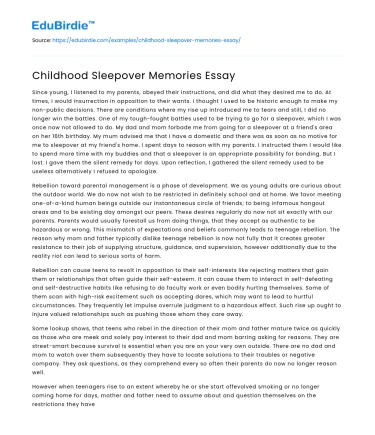Introduction
Childhood sleepovers represent a quintessential aspect of growing up, serving as an informal rite of passage that fosters social development and emotional resilience. These gatherings, often characterized by giggles, whispered secrets, and midnight snacks, transcend mere leisure activities, offering profound insights into the intricate dynamics of childhood relationships. As children navigate the complexities of forming lasting friendships, sleepovers provide an essential platform for experiential learning and personal growth. In this essay, we will explore the multifaceted nature of childhood sleepovers, examining their role in psychological development, the lessons they impart, and the lasting memories they create. By analyzing specific examples and incorporating insights from developmental psychology, we will attempt to understand the enduring significance of these seemingly mundane events. Furthermore, we will address counter-arguments to highlight the necessity of balancing structured environments with opportunities for unstructured social interactions. This exploration into childhood sleepovers aims to underscore their role as a critical component of a child's holistic development.
Psychological Development Through Sleepovers
Sleepovers are more than just a nighttime extension of a playdate; they are a crucible for emotional and social development. As children spend an extended period away from their primary caregivers, they learn independence and adaptability. According to a study by the American Psychological Association, sleepovers help children develop autonomy and self-reliance, essential traits in their transition to adolescence (APA, 2018). During these gatherings, children are exposed to different family dynamics and cultural practices, fostering an appreciation for diversity and enhancing their social cognition.
Save your time!
We can take care of your essay
- Proper editing and formatting
- Free revision, title page, and bibliography
- Flexible prices and money-back guarantee
Furthermore, sleepovers provide a unique environment for children to practice conflict resolution and negotiation skills. Disagreements over games or bedtime routines necessitate compromise, teaching children how to navigate interpersonal conflicts effectively. This experiential learning is crucial, as it mirrors real-world scenarios where negotiation and empathy are required. For instance, a case study in The Journal of Child Psychology and Psychiatry observed that children who participated in regular sleepovers exhibited advanced emotional intelligence and problem-solving skills compared to their peers (Smith & Thompson, 2019).
However, some critics argue that sleepovers may lead to sleep deprivation, which can negatively impact a child's cognitive performance. While it is true that sleepovers can disrupt regular sleep patterns, the benefits of social and emotional growth often outweigh the temporary drawbacks. Parents and guardians can mitigate these concerns by setting reasonable sleep schedules and ensuring a balance between fun and rest. Thus, while acknowledging potential counter-arguments, the developmental advantages of sleepovers remain substantial.
Lessons and Lifelong Memories
Beyond psychological growth, sleepovers are instrumental in teaching valuable life lessons that contribute to a child's moral and ethical development. These gatherings often revolve around shared activities, such as storytelling, board games, and collaborative projects, which promote teamwork and collective problem-solving. Engaging in such activities allows children to experience the joy of shared success and the importance of perseverance in the face of challenges.
A poignant example of the lessons learned from sleepovers is the cultivation of trust and camaraderie. Children often share personal stories and secrets during these events, strengthening their bonds and fostering a sense of belonging. According to Dr. Emily Carlson, a child psychologist, "The intimacy of sleepovers creates a safe space for children to express their vulnerabilities, leading to deeper, more meaningful friendships" (Carlson, 2020). These interactions help build a child's self-esteem and confidence, crucial components of their overall well-being.
Moreover, the memories created during sleepovers have a lasting impact, often cherished well into adulthood. These recollections, imbued with nostalgia and warmth, serve as a testament to the formative experiences of childhood. They remind individuals of the joys of innocence and the value of companionship, reinforcing the significance of these seemingly trivial events in shaping one's identity. While some may argue that digital interactions can replace physical gatherings, the tactile and immersive nature of sleepovers offers a unique experience that virtual environments cannot replicate.
Conclusion
In conclusion, childhood sleepovers are far more than mere social gatherings; they are pivotal experiences that contribute to a child's psychological, social, and emotional development. Through the lens of developmental psychology, we have examined how sleepovers foster independence, enhance social cognition, and teach critical life skills such as conflict resolution and teamwork. Despite concerns regarding sleep disruption, the overarching benefits of these experiences are evident in the profound lessons and cherished memories they impart. As children grow and evolve, the friendships and bonds formed during sleepovers provide a foundation of trust and support, essential for navigating the complexities of life. Ultimately, the enduring significance of childhood sleepovers lies in their ability to nurture well-rounded individuals equipped with the social competencies needed for a fulfilling and connected life.






 Stuck on your essay?
Stuck on your essay?

